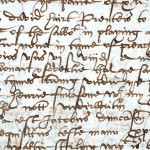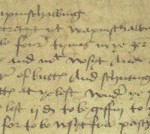CH2/1026/2 Stirling’s earliest written reference to golf. Holy Rude Kirk Session minutes, 30th January 1621
David Hart is recorded here being brought in front of the Stirling Kirk Session for what was known as ‘breaking the sabbath’. The sanctity of Sunday as a day of rest was very strictly observed by the Established Church in Scotland and those accused of contravening this were dealt with harshly by the Session Court. The Kirk Session of the Parish was responsible for enforcing good moral standards amongst the congregation and the meetings of the Court brought those accused of various transgressions to account for themselves. Those judged to be guilty were usually fined and then made to do penance. The penance asked for depended on the severity of the crime but could include being made to stand by the pulpit of the parish church dressed in sackcloth for a number of Sundays.
Here we see David Hart up in front of the Kirk Session of Stirling’s Holy Rude Kirk for ‘prophanatioune of the sabbot in playing at the goff in the park’ the park here being the King’s Park, Stirling. It is thought that the modern game of golf was developed in Scotland and it is definitely known to have been played here from the 14th century onwards if not earlier. A 1457 Act of King James II prohibited the playing of golf and football to encourage men to spend their leisure time at their archery practice so that they would be of good use as soldiers. Similar bans on the game were issued in 1471 and 1491. The minutes of Edinburgh Town Council of 19th April 1592 include golf in a list of pursuits that are to be avoided on the Sabbath. It was well established then by 1621 that golf was a popular game but that the playing of it was to be discouraged on the Lord’s Day.
The seriousness of the misdemeanour in the eyes of the church is indicated by the fact that David Hart is fined the sum of 6 shillings and 8 pence. He is also expected to enter into an agreement not to play golf on a Sunday in the future with the cautioner or guarantor to that bond being given as Henry Finlayson. Finlayson signs an undertaking to ensure that this is the case and this oath is witnessed by the Notary Public James Duncanson: “And henrie Finlasone tailyur Is betu[r] cautionant &severlie that the said david sall abstain fra the Lyk fault in tymes cu[m]ing undir the paine of xi s[hillings].” Should Henry fail to prevent David from sliding back into sin, he will also be liable to be fined a hefty 11 shillings.

